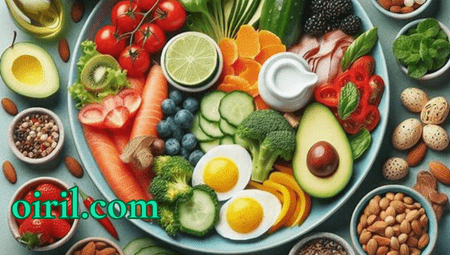A Comprehensive Guide to Nutrition and Well-being
Healthy eating is the foundation of overall well-being, influencing everything from your physical fitness to your mental health. As we approach 2024, the landscape of nutrition is shifting, driven by new research, technological advancements, and a deeper understanding of the role food plays in our lives. Whether your goal is to maintain a balanced diet, lose weight, or boost your energy levels, this guide will provide you with updated, evidence-based healthy eating tips to support your journey in the new year.
Focus on Whole, Minimally Processed Foods
One of the most effective ways to improve your diet is by focusing on whole, minimally processed foods. These foods are rich in essential nutrients, including vitamins, minerals, fiber, and antioxidants, while being low in added sugars, unhealthy fats, and artificial additives. In 2024, the emphasis on whole foods is stronger than ever, as more people move away from highly processed products that can negatively affect health.
Pro Tip: Fill your plate with a variety of colorful fruits and vegetables, lean proteins (such as chicken, fish, tofu, and legumes), whole grains (like quinoa, oats, and brown rice), and healthy fats (from sources like avocado, nuts, and olive oil). The more natural and unprocessed your food, the better it will fuel your body.
Personalize Your Nutrition Plan
No two people are the same, and neither are their nutritional needs. The concept of personalized nutrition is gaining significant traction in 2024, as individuals increasingly recognize the importance of tailoring their diets to their unique biology, lifestyle, and health goals. Factors like age, activity level, metabolic rate, and even genetics can influence what type of diet is best for you.
New technologies, including DNA testing and microbiome analysis, are making it easier for people to create personalized nutrition plans. However, even without advanced tools, you can start by paying attention to how different foods affect your body.
Pro Tip: Keep a food journal to track what you eat and how it makes you feel. Over time, you’ll start to notice patterns and can adjust your diet to include more foods that boost your energy and digestion while minimizing those that cause discomfort.
Prioritize Plant-Based Eating (Even if You’re Not Vegan)
Plant-based eating continues to gain popularity, not just for ethical or environmental reasons but also for its significant health benefits. Diets rich in plant-based foods like vegetables, fruits, legumes, nuts, and seeds have been linked to a reduced risk of chronic diseases such as heart disease, diabetes, and cancer. In 2024, you don’t have to go fully vegan or vegetarian to reap these benefits. Simply increasing the proportion of plant-based foods in your diet can make a difference.
Pro Tip: Try incorporating at least one plant-based meal into your day. Start with a nutrient-dense salad or a vegetable-packed smoothie for breakfast or opt for meatless dinners a few times a week.
Mindful Eating and Portion Control
With the fast-paced nature of modern life, it’s easy to fall into the habit of eating mindlessly—whether you’re watching TV, working, or scrolling through social media. In 2024, mindful eating practices are becoming increasingly important as more people look to cultivate a healthier relationship with food. Mindful eating involves paying attention to your body’s hunger and fullness cues, savoring each bite, and reducing distractions during meals.
Portion control is another essential aspect of maintaining a balanced diet. Overeating, even with healthy foods, can lead to unwanted weight gain and digestive discomfort.
Pro Tip: Slow down your eating by putting your fork down between bites, chewing thoroughly, and taking deep breaths. Use smaller plates to naturally limit portion sizes and prevent overeating.
Limit Added Sugars and Artificial Sweeteners
Excessive sugar intake is one of the leading contributors to obesity, type 2 diabetes, and heart disease. While cutting out all sugar can be challenging, especially with its prevalence in processed foods, reducing your intake of added sugars is crucial for better health. In 2024, many experts recommend limiting added sugars to less than 10% of your total daily calories.
Artificial sweeteners, which are often used as sugar substitutes in “diet” foods and beverages, are also under scrutiny. Some studies suggest that these sweeteners may disrupt metabolism, increase cravings, and negatively impact gut health.
Pro Tip: Read labels carefully to identify hidden sugars in foods like sauces, dressings, and packaged snacks. Replace sugary beverages with water, herbal teas, or naturally flavored seltzer. When craving something sweet, opt for whole fruits, which provide natural sugars along with fiber and nutrients.
Stay Hydrated, but Don’t Overdo It
Proper hydration is a cornerstone of healthy living, affecting everything from your energy levels to your skin health. While the “8 glasses of water a day” rule is widely known, your individual hydration needs can vary depending on factors like activity level, climate, and diet. In 2024, the focus is shifting toward personalized hydration, with experts recommending that you listen to your body’s signals to determine how much water you need.
However, overhydration can also be problematic. Drinking too much water can dilute essential electrolytes, leading to imbalances in the body.
Pro Tip: Instead of forcing yourself to meet a specific number of glasses, pay attention to your body. Drink when you’re thirsty, and monitor the color of your urine—pale yellow indicates proper hydration. Include hydrating foods like cucumbers, watermelon, and oranges in your diet.
Balance Macronutrients: Protein, Carbs, and Fats
In 2024, there’s a renewed emphasis on the importance of balancing macronutrients—proteins, carbohydrates, and fats. Each of these macronutrients plays a vital role in maintaining overall health, and striking the right balance is essential for optimal energy, muscle function, and metabolic health.
- Protein is crucial for muscle repair, immune function, and hormone regulation. Include a variety of protein sources in your diet, such as lean meats, fish, eggs, legumes, and plant-based options like tofu and tempeh.
- Carbohydrates provide the body’s primary source of energy. Opt for complex carbs like whole grains, vegetables, and legumes, which release energy slowly and are rich in fiber.
- Healthy fats, such as those found in avocados, olive oil, and nuts, support brain health, hormone production, and heart health.
Pro Tip: Aim to include all three macronutrients in each meal. For example, a balanced lunch might include grilled chicken (protein), quinoa (carbs), and avocado (healthy fat).
Gut Health: Feed Your Microbiome
Gut health remains a hot topic in the world of nutrition, with more research highlighting the connection between the gut microbiome and overall well-being. In 2024, the focus on gut health continues, as maintaining a healthy balance of gut bacteria has been shown to improve digestion, support the immune system, and even influence mental health.
To promote a healthy gut microbiome, include a variety of fiber-rich foods, probiotics, and prebiotics in your diet. Probiotic-rich foods, such as yogurt, kefir, sauerkraut, and kimchi, contain beneficial bacteria that support gut health. Prebiotics, found in foods like garlic, onions, and bananas, serve as food for these beneficial bacteria.
Pro Tip: Incorporate fermented foods and high-fiber vegetables into your meals regularly to support a diverse and thriving microbiome. Avoid excessive antibiotic use, as it can disrupt the balance of good bacteria in the gut.
Sustainable Eating: Think About the Planet
Sustainability continues to play a central role in healthy eating trends in 2024. Eating in a way that supports both your health and the planet involves making mindful choices about where your food comes from and how it’s produced. This includes reducing food waste, opting for locally grown and seasonal produce, and choosing plant-based or sustainably sourced animal products.
Pro Tip: Plan your meals around seasonal ingredients to reduce your environmental impact and enjoy fresher, more nutrient-dense foods. Buy in bulk and use reusable containers to minimize packaging waste.
Prioritize Meal Preparation
With busy schedules, it’s easy to rely on convenience foods, but meal preparation is one of the best ways to ensure you’re eating healthy throughout the week. Preparing meals in advance allows you to control ingredients, portion sizes, and nutritional content, making it easier to stick to your healthy eating goals. In 2024, meal prep remains an effective strategy for maintaining a balanced diet, even with a hectic lifestyle.
Pro Tip: Set aside time on the weekends to plan and prepare meals for the week ahead. Invest in quality storage containers and portion out meals for quick grab-and-go options during busy weekdays.
Healthy eating in 2024 is about more than just following a set of rules—it’s about finding balance, personalization, and sustainability. By focusing on whole, minimally processed foods, listening to your body, and incorporating mindful eating practices, you can create a nutrition plan that supports both your health and the planet. Whether your goal is to lose weight, build muscle, or simply feel better, these updated healthy eating tips will help you make informed choices for a healthier future.




